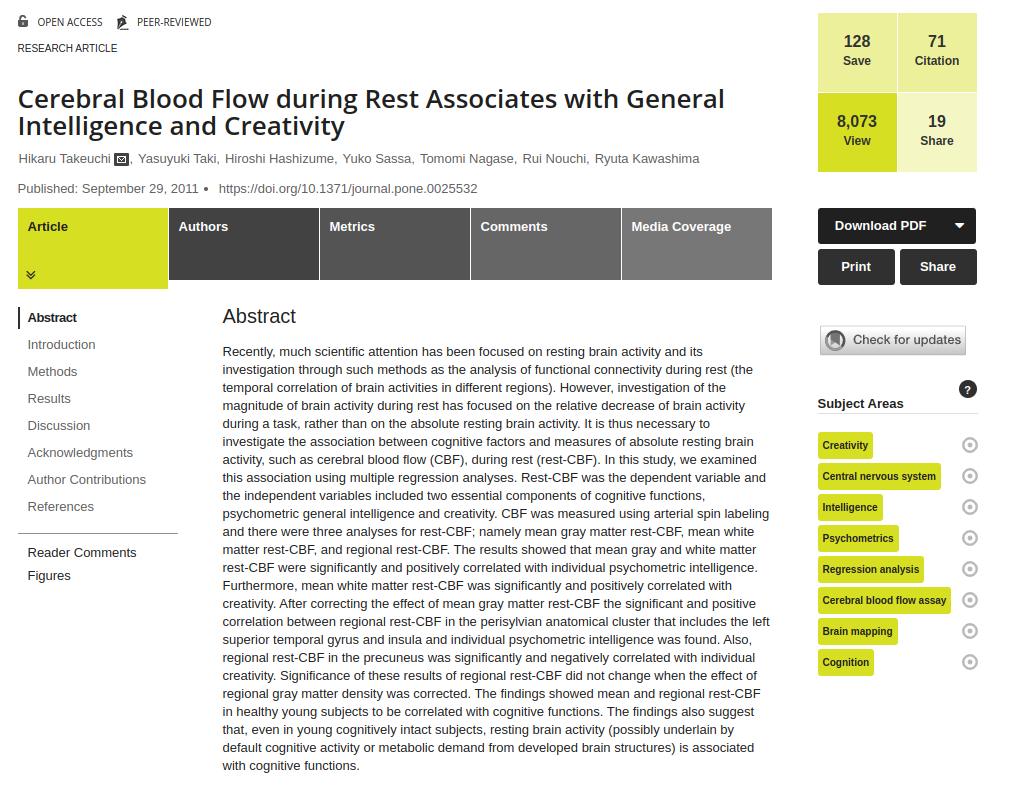Recently, much scientific attention has been focused on resting brain activity and its investigation through such methods as the analysis of functional connectivity during rest (the temporal correlation of brain activities in different regions). However, investigation of the magnitude of brain activity during rest has focused on the relative decrease of brain activity during a task, rather than on the absolute resting brain activity. It is thus necessary to investigate the association between cognitive factors and measures of absolute resting brain activity, such as cerebral blood flow (CBF), during rest (rest-CBF). In this study, we examined this association using multiple regression analyses. Rest-CBF was the dependent variable and the independent variables included two essential components of cognitive functions, psychometric general intelligence and creativity. CBF was measured using arterial spin labeling and there were three analyses for rest-CBF; namely mean gray matter rest-CBF, mean white matter rest-CBF, and regional rest-CBF. The results showed that mean gray and white matter rest-CBF were significantly and positively correlated with individual psychometric intelligence. Furthermore, mean white matter rest-CBF was significantly and positively correlated with creativity. After correcting the effect of mean gray matter rest-CBF the significant and positive correlation between regional rest-CBF in the perisylvian anatomical cluster that includes the left superior temporal gyrus and insula and individual psychometric intelligence was found. Also, regional rest-CBF in the precuneus was significantly and negatively correlated with individual creativity. Significance of these results of regional rest-CBF did not change when the effect of regional gray matter density was corrected. The findings showed mean and regional rest-CBF in healthy young subjects to be correlated with cognitive functions. The findings also suggest that, even in young cognitively intact subjects, resting brain activity (possibly underlain by default cognitive activity or metabolic demand from developed brain structures) is associated with cognitive functions.
Cerebral Blood Flow during Rest Associates with General Intelligence and Creativity
Publication
PLOS ONE
Abstract
Web and Email Links
Related Listings
Journal
International Journal of Cardiology
We report extremely prominent heart rate oscillations associated with slow breathing during specific traditional forms of Chinese Chi and Kundalini Yoga meditation techniques in healthy young adults. We applied both spectral analysis and a novel analytic technique based on the Hilbert transform to quantify these heart rate dynamics. The amplitude of these oscillations during meditation was significantly greater than in the pre-meditation control state and also in three non-meditation […]
Journal
Journal of Research and Development in Education
Evaluated self-esteem and locus of control in a group of high school students prior to, during, and following a single academic year. Using a randomized, crossover experimental design, 26 Ss were exposed to either a health curriculum based on elicitation of the relaxation response (RLR) and then a follow-up period, while 24 were assigned to a control health curriculum and then the RLR. Psychological testing was conducted using the Piers-Harris Children's Self Concept Scale and the Now […]
Journal
Science
Sympathetic nervous system activity was assessed in experimental and control subjects who were exposed to graded orthostatic and isometric stress during monthly hospital visits. After the first session, the experimental subjects practiced a technique that elicited the relaxation response. Their concentrations of plasma norepinephrine during subsequent graded stresses were significantly higher. No such changes were noted in the control group. These results were then replicated in the c […]

